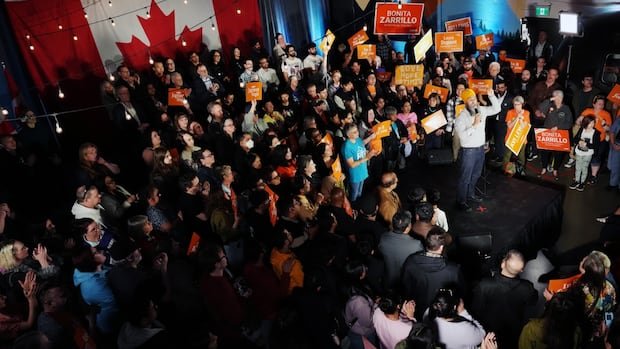During the telephone call last month between Donald Trump and Mark Carney, the president of the United States made the idea of making Canada the 51st American state on the table, contrary to what Prime Minister himself declared publicly later, sources told Radio-Canada.
According to two Radio-Canada sources with knowledge of the discussion, the issue of Canadian sovereignty was raised in the first part of the conversation.
At the end of this moment, described as “not easy” by a source, Carney said: “We will agree to disagree on that.”
According to Radio-Canadá sources, Trump raised the issue of State 51 during the call of March 28, explaining the advantages of Canada that bind to the US. Uu. Carney allowed him to speak before expressing his disagreement.
That contradicts what the prime minister told journalists at a press conference later that day, when he suggested that Trump had set aside his expansionist language during the conversation.
“The President respected Canada’s sovereignty today both in his private and public comments,” said Carney on March 28.
The leader of the Liberal Party, Mark Carney, says that his phone call with US President Donald Trump on Friday morning was very “cordial” between two leaders of two sovereign nations. Carney says Trump respected Canada’s sovereignty both in her private and public comments on Friday.
In a statement, a spokeswoman for the Prime Minister’s office did not denied Trump to raise the issue of State 51, but denied that Carney respond with “we will agree to disagree.”
“No, the prime minister did not tell President Trump, and he was always clear that the possibility that Canada could be part of the United States is not on the table and will never be.”
“When facing this crisis, Prime Minister Carney is communicating his plan with Canadians everywhere to combat the commercial war launched by Trump,” said the statement, which was in French, below.
These revelations occur only a few days before the end of an electoral campaign in which the Canada-United States relationship has become the dominant issue for many Canadians. For weeks, the liberal leader has been stating that he has the necessary experience and that he is better located to face Trump.
“I have managed crisis before,” he repeated on numerous occasions, again on Wednesday, when I was in Victoria.
Before his call with the US president, Carney declared that he would only talk to Trump if the latter showed respect for Canada.
“I am available for a call, but you know, let’s talk about our terms as a sovereign country,” said March 24, the second day of the electoral campaign.
A public change in tone
Trump’s comments published in Truth Social on the day of the call certainly pointed out a change of tone, at least in public.
Immediately after the call, the president of the United States described his meeting with Carney as “extremely productive.” And he referred to Carney as the Prime Minister of Canada, instead of “governor” as he typically did with Justin Trudeau.
On Wednesday, Trump congratulated Carney, calling him “very pleasant.” But also mentioned the concept of Canada as state 51.
The president of the United States, Donald Trump, warned that 25 percent of tariffs against Canadian manufacturing cars could rise. He also expressed his desire to turn Canada in state 51 after a period of relative tranquility about his threats of annexation.
“I have to be honest, as a state works very well,” Trump said. “The ninety -five percent of what they do is that they buy us and sell us,” he said.
White House spokeswoman Karoline Leavitt said last week that the president’s position had not changed, and Trump “believes that the Canadians would benefit greatly from becoming the 51st state of the United States of America.”
Other topics discussed
In addition to the issue of State 51, the two leaders discussed other issues during the call, including the commercial relationship between Canada and the United States.
According to Radio-Canadá sources, Carney proposed a review of the economic and security agreement between the two countries, after the federal elections, which Trump accepted.
“It is important that Canada does not negotiate separately, only in the automotive sector, for example,” said a source familiar with discussions. “We believe we can win more if we review everything at the same time. On the border, Americans are talking about fentanil, but we also have problems with weapons.
“The tone of the call was generally positive,” added the source.
In recent weeks, conservative leader Pierre Poilievre has criticized Carney’s positioning, saying he has falsely claimed that he could control Trump. On Thursday in Halifax, he asked about this story, Pailievre said Carney should explain what happened in the call.
“That is a question for Mr. Carney to answer. I wasn’t there. But what is clear is that we will defend our sovereignty. We will never be an American state.”
The conservative leader Pierre Poilievre, when asked about a radio-channel report that said that the president of the United States, Donald Trump, mentioned the “State 51” during a call with Prime Minister Mark Carney, said that his liberal rival will have to explain and reiterated his call to defend sovereignty and the Canada’s approach in the things that Canada can control.
The Yves-François Blanchet block said Wednesday that “we have no information in the sense that Mr. Carney is up to his statements as a great crisis manager.”
The leader of the NDP, Jagmeet Singh, questioned if you can trust Carney to tell the truth about the negotiations with Trump if she wins the elections.
“With all this fear returning, people are concerned about what this means for their jobs. People are worried about what this means for their families,” said Singh during a campaign stop in Winnipeg.
“We are also worried about how negotiations will see and we recently knew that Mark Carney was not being totally direct with us.”
Carney agreed to talk to Trump again after the federal elections if his party wins.









